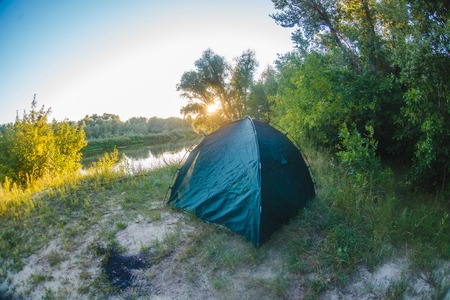Understanding the Legal Landscape of Wild Camping in Cornwall
If you’re planning to pitch your tent along Cornwall’s rugged coastline, it’s crucial to get to grips with the legalities before heading out. Unlike Scotland, where wild camping is largely permitted under the Land Reform Act, England – including Cornwall – operates under stricter land access laws. In short, wild camping without landowner permission is technically illegal almost everywhere in Cornwall, even on its windswept cliffs and secluded coves. That said, enforcement varies and local attitudes can be surprisingly tolerant, especially if campers are discreet and respectful. Key restrictions include protected areas such as Sites of Special Scientific Interest (SSSIs), National Trust properties, and private farmland, where camping without explicit consent is likely to result in being moved on or fined. Grey areas do exist: some landowners turn a blind eye if you leave no trace and stay just one night, while certain remote spots have become unofficially accepted for low-impact bivvying. Still, always check signage and avoid blocking paths or disturbing wildlife. For the most up-to-date information and official guidance, consult resources like the Cornwall Council website or the South West Coast Path Association. Ultimately, responsible wild campers who make an effort to seek permission and abide by the countryside code are less likely to run into trouble.
Essential Kit for Surviving the Cornish Elements
If you’re planning to wild camp along Cornwall’s rugged coastline, preparing for the region’s unpredictable weather is non-negotiable. The Atlantic winds, sudden downpours, and salty air are unforgiving – so packing the right kit can mean the difference between a memorable adventure and a miserable ordeal. Here’s a rundown of must-have gear that no wild camper should be without when tackling the Cornish coast.
Top Gear for Wild Camping in Cornwall
| Kit Item | Why You Need It | Recommended Features/Brands |
|---|---|---|
| Durable Tent | Withstands high winds and driving rain common along the cliffs. | Low-profile, double-skinned; brands like Vango or MSR. |
| Windproof Jacket & Trousers | Keeps you dry and warm when the coastal gales hit. | Breathable, waterproof, with taped seams (Berghaus, Rab). |
| Four-Season Sleeping Bag | Nights get chilly even in summer; insulation is vital. | Synthetic fill or treated down; Snugpak or Mountain Equipment. |
| Sturdy Walking Boots | Rough terrain means good grip and ankle support are essential. | Waterproof, Vibram soles (Scarpa, Meindl). |
| Lightweight Stove & Fuel | Open fires are often illegal – portable stoves are a safe alternative. | Gas canister or spirit stove (Jetboil, Trangia). |
Packing for the Unpredictable
Cornwall’s weather can flip in minutes. Always pack layered clothing – merino wool base layers work wonders against the damp chill. Dry bags keep kit protected from sea spray and sudden showers. Don’t forget a reliable headtorch (Petzl or Black Diamond) for those late-night brew-ups or emergency tent repairs. A tough, refillable water bottle is essential as fresh water sources aren’t always available near remote coves.
A Word on Safety and Respect
Mobile phone signal is patchy at best along many stretches of the Cornish coast. Carry an OS map (Landranger 204 or Explorer 102 cover most of the coastline) and a compass – don’t rely solely on GPS. And always leave no trace: pack out what you pack in, including rubbish and food waste. Being prepared isn’t just about comfort – it’s about respecting both the law and the land so that wild camping remains an option for future adventurers.

3. Finding the Perfect Spot Without Fanning Flames
If you want to wild camp along Cornwall’s rugged coastline without drawing unwanted attention, location is everything. The golden rule? Blend in and leave no trace. Start by seeking out secluded coves, hidden valleys, or sheltered dunes away from popular footpaths and obvious viewpoints. Avoid pitching up near car parks, villages, or anywhere that might be on a farmer’s regular route—these are hotspots for ranger patrols and landowner visits.
Safety First: Avoiding Natural Hazards
Cornwall’s beauty hides its dangers. Steer clear of cliff edges; erosion is real and the wind can shift in an instant. Check tides if you’re tempted by a beach bivvy—nothing ruins a night like waking up to a rising sea. Make sure your pitch isn’t in a livestock field or blocking public rights of way.
Staying Discreet
Choose muted-colour gear that blends with the landscape—greens, browns, and greys over bright reds or blues. Set up camp late in the day and pack away early; dusk arrivals and dawn departures are best for keeping a low profile. Keep group size small—solo campers or pairs attract less attention than big groups.
Respecting the Environment
Stick to established flat spots if you find them, rather than trampling fresh ground. Don’t build fires: aside from being illegal in many spots, they scar the landscape and alert others to your presence. Use a camping stove for cooking, and always pack out all rubbish, including food scraps. Remember—the only sign you should leave is flattened grass that will bounce back by morning.
4. Leave No Trace: Wild Camping Etiquette
Wild camping along Cornwall’s rugged coastline offers breathtaking views and a sense of true freedom—but with that comes responsibility. To ensure future generations can enjoy these wild spaces, it’s vital to follow Leave No Trace principles. Here’s how you can minimise your impact, deal with waste properly, and show respect to local wildlife and fellow campers.
Guidelines for Minimal Impact
- Pitch Responsibly: Set up camp late in the day and break down early. Choose durable ground away from footpaths, cliff edges, and farmland.
- Camp in Small Numbers: Solo or duo camping causes less disturbance and is more likely to go unnoticed by landowners.
- Avoid Fires: Open fires are risky on Cornwall’s dry coastal grasslands and often illegal. Use a portable stove instead for cooking.
Dealing with Waste
Waste management is critical on the coast, where wind and rain can quickly spread rubbish into the sea. Stick to these best practices:
| Type of Waste | What to Do |
|---|---|
| Rubbish | Pack it out—take all litter home, including food scraps and packaging. |
| Human Waste | Bury at least 15cm deep and 50m away from water sources, or use a portable toilet bag system. |
| Greywater (washing up) | Use biodegradable soap sparingly; scatter greywater well away from streams or beaches. |
Respecting Wildlife and Others
- Keep Noise Down: The coast is home to nesting seabirds and shy mammals; keep voices low and avoid loud music.
- No Feeding Animals: Human food harms local fauna—observe from a distance only.
- Share the Space: If you encounter other wild campers or walkers, be friendly but give them space—it’s all part of the unwritten code of the outdoors.
Cornwall-Specific Etiquette Tips
- Avoid Blocking Footpaths: Many Cornish routes double as public rights of way—never pitch across a path or stile.
- Respect Private Land: If approached by a landowner, always be polite, explain your intentions, and move on if asked without argument.
- Sensitive Sites: Some areas are Sites of Special Scientific Interest (SSSIs)—camp elsewhere to protect rare habitats and species.
The Bottom Line
If you leave your spot looking untouched, you’re doing it right. Carry out what you carry in, tread lightly, and show respect—for the environment, for wildlife, and for those who’ll come after you. That’s the wild camper’s code on Cornwall’s coast.
5. Staying Safe and Sound on the Coast
Respect the Power of Tides
Cornwall’s coastline is as dramatic as it is unpredictable. Knowing your tide times isn’t optional—it’s critical. Spring tides can flood beaches and cut off headlands faster than you’d expect, so always check local tide tables before pitching up. Never camp on sandbanks or below the high-water mark. If in doubt, ask a local fisherman or lifeguard for advice; they know these waters inside out.
Cliff-Edge Caution
Cliffs are quintessential Cornwall, but they come with risks. Strong winds and loose edges mean you should never camp near cliff-tops, no matter how tempting the view. Stay well back from unstable ground, especially after heavy rain when erosion is at its worst. Always keep torches handy if you’re moving about after dark—Cornish cliffs don’t forgive missteps.
Prepare for Changeable Weather
The weather here turns on a sixpence. Brilliant sunshine can give way to Atlantic squalls without warning. Bring tough, waterproof kit and layers for warmth—even in summer, nights get chilly. Secure your tent against sudden gusts, and pack a spare tarp to keep gear dry. Wet kit is miserable kit, so take no chances with shelter.
Emergency Contacts Unique to Cornwall
If things go pear-shaped, dial 999 and ask for the coastguard—they’re trained for coastal emergencies. Keep a charged mobile with local OS grid references handy (apps like OS Maps work offline). For non-urgent issues, note down numbers for Cornwall Search & Rescue and local lifeboat stations before setting out. Let someone trustworthy know where you’ll be camping and when you expect to return; Cornish terrain is beautiful but unforgiving if you get lost or injured.
Final Safety Reminders
Trust your instincts—if a spot feels risky, move on. Respect nature’s power and remember: wild camping by the Cornish coast demands caution as much as it promises adventure.
Local Knowledge: Top Tips From Seasoned Cornish Campers
If you want to wild camp like a true Cornish local, there’s no substitute for hard-earned wisdom passed down by those who’ve braved the coast in all weathers. Here are the best insider tips and practical hacks from experienced wild campers and Cornwall natives.
Scout Out Hidden Gems
Forget the obvious tourist hotspots. Locals recommend checking out lesser-known coves between Portreath and Godrevy or quiet stretches near Penwith. Always approach private landowners politely—some are happy to let you pitch if you respect their space and leave no trace. Use OS maps to find public footpaths leading to secluded headlands, but always make sure you’re not trespassing.
Respect the Elements
Cornwall’s weather is notoriously unpredictable. Seasoned campers swear by carrying a proper bivvy bag and a sturdy tarp—forget cheap pop-up tents unless you fancy waking up soaked. Face your tent away from prevailing south-westerlies, and stake down securely with extra-long pegs on exposed cliffs or dunes.
Pubs, Water, and Supplies
Nothing beats ending a windswept day at a welcoming Cornish pub. The locals rate The Tinners Arms in Zennor for its real ale and hearty grub. For water, bring purification tablets; many streams run off farmland and aren’t safe to drink untreated. Some village shops will refill bottles if you ask nicely and buy a pasty or two. Stock up in St Ives or Penzance before heading off-grid—the little shops close early.
Stealth Camping Etiquette
The golden rule is: arrive late, leave early, and never light fires on the fragile heathland. Keep your kit low-profile—earth-coloured tarps and tents blend in better than anything bright. If you meet a local on an early walk, be friendly and honest about what you’re doing. Most Cornish folk appreciate respect for their land and will share advice if they see you’re not causing trouble.
Wildlife and Quiet Enjoyment
Dawn is prime time for spotting seals off Kynance Cove or choughs soaring over the Lizard. Experienced campers always keep binoculars handy and avoid nesting sites during bird breeding season (March-July). Remember—wild camping here isn’t just about roughing it; it’s about soaking up Cornwall’s wild soul with as little impact as possible.
By learning from those who know these coasts best, you’ll not only stay safer—you’ll discover secret corners of Cornwall that most tourists never see.


